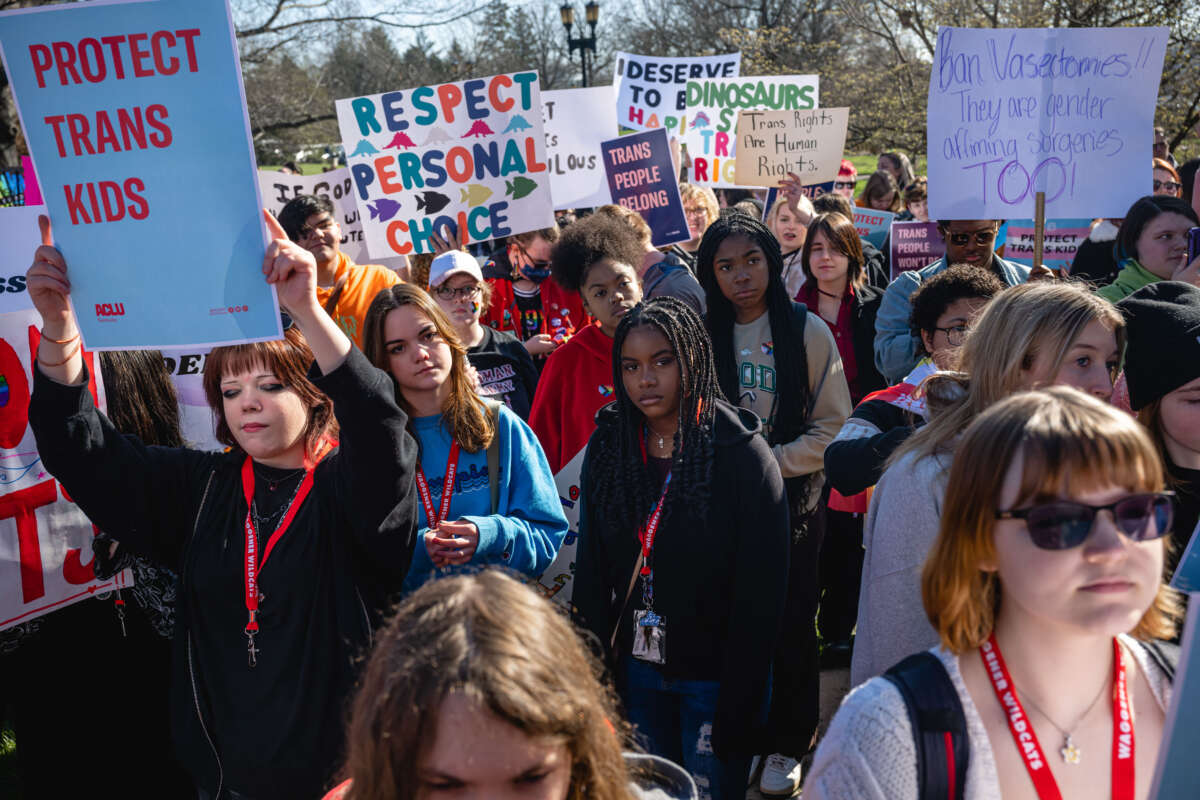Kentucky’s ban on gender-affirming care for transgender youth took effect on Friday as United States District Judge David Hale lifted an injunction he issued last month that had temporarily blocked the restriction. The federal judge’s ruling came at the request of Republican Kentucky Attorney General Daniel Cameron, who has called gender-affirming care “child mutilation,” despite the American Medical Association and other medical experts overwhelmingly supporting access to gender-affirming care for transgender youth.
“While we strongly disagree with this opinion, it is only in effect while our appeal is pending in front of the Sixth Circuit,” said Corey Shapiro, legal director for the American Civil Liberties Union of Kentucky, in a statement about the ruling. “It is not the final word, and we remain optimistic that with a full briefing we will achieve a positive result.”
To pass the gender-affirming health care ban in March, Kentucky’s GOP introduced the legislation with little to no notice in violation of the state’s public meetings law. While Democratic Kentucky Gov. Andy Beshear vetoed the legislation, Republican lawmakers were able to override the governor’s veto. Hundreds protested the veto-override at the state capitol, leading to at least 19 people being arrested and charged with criminal trespass for doing so.
Last month, Judge Hale, an Obama administration appointee, had blocked portions of Kentucky’s gender-affirming care ban a day before the measure was set to take effect, holding that the plaintiffs in the lawsuit — six children currently receiving health care that would be banned under the law — would be harmed if the law were to go into effect.
In his June ruling, Judge Hale said that, “the treatments barred by [Senate Bill] 150 are medically appropriate and necessary for some transgender children under the evidence-based standard of care accepted by all major medical organizations in the United States.” Judge Hale also said the plaintiffs had “a strong likelihood of success on the merits” for their constitutional challenges to the ban.
On the same day Judge Hale issued the injunction, another judge blocked a gender-affirming care ban in Tennessee. However, earlier this month, a panel of Sixth Circuit judges voted to reverse the block on the Tennessee law while the measure is being challenged in court. The stay of Judge Hale’s injunction on Kentucky’s gender-affirming care for transgender youth cited the Sixth Circuit’s recent decision on Tennessee’s ban.
“Today marks the beginning of what is hopefully a short, temporary period, but an extremely difficult moment for Kentucky’s trans youth,” said Ban Conversion Therapy Kentucky Executive Director Rebecca Blankenship and Government Affairs Director Michael Frazier.
At least 20 states have enacted laws restricting or banning gender-affirming medical care for minors, triggering constitutional challenges. While federal judges have struck down a ban in Arkansas and temporarily blocked bans in Alabama, Indiana and Florida, transgender advocates are concerned that appeals in conservative circuit courts may lead to the conservative Supreme Court upholding a state-level gender-affirming care ban.
“Six federal district court judges have ruled on challenges to medical bans, including Kentucky’s. Each one has listened carefully to the evidence and found that these bans have no basis in medical science, discriminate against transgender youth, and cause serious harms by denying medically needed care,” said Shannon Minter, legal director of the National Center for Lesbian Rights, the ACLU of Kentucky’s co-counsel in the case. “We are hopeful that when the Sixth Circuit reviews the record and has the benefit of full briefing in this case, it will reach the same conclusion.”
Press freedom is under attack
As Trump cracks down on political speech, independent media is increasingly necessary.
Truthout produces reporting you won’t see in the mainstream: journalism from the frontlines of global conflict, interviews with grassroots movement leaders, high-quality legal analysis and more.
Our work is possible thanks to reader support. Help Truthout catalyze change and social justice — make a tax-deductible monthly or one-time donation today.
